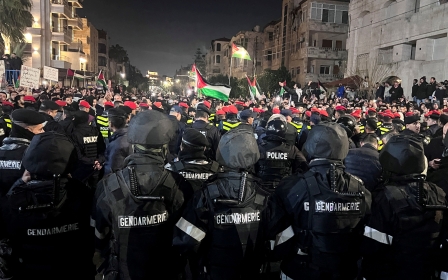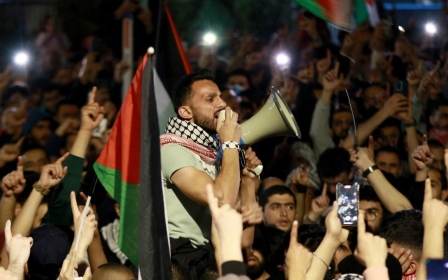Jordanian authorities shut down Muslim Brotherhood-linked TV station

Jordanian security forces have shut down a Muslim Brotherhood-affiliated channel, part of wider crackdown on pro-Palestinian activism in the Kingdom.
On 7 May, security forces stormed the Al-Yarmouk TV channel offices in Amman, seizing broadcasting equipment and barring employees from entering the building.
The public prosecutor ordered the closure of the network "due to its unauthorised activity and broadcasting from Jordan without obtaining official governmental approvals".
The US-based Committee to Protect Journalists (CPJ) called on the Jordanian authorities to reopen the channel, linking its closure to a broader crackdown on journalists in the country.
"CPJ calls on the Jordanian authorities to allow all journalists and media outlets to do their job freely and without fear of retaliation," CPJ programme director Carlos Martinez de la Serna said.
Stay informed with MEE's newsletters
Sign up to get the latest alerts, insights and analysis, starting with Turkey Unpacked
Al-Yarmouk has aired content from the Hamas-affiliated broadcaster Al-Aqsa TV since the French satellite operator Eutelsat stopped the outlet from broadcasting in October 2023.
In a statement on Facebook, Al-Yarmouk said it had filed for a licence, which was pending approval. It said the network had faced shutdowns in the past for broadcasting without a permit but had been acquitted of these charges.
Two years after its launch in 2013, the channel was shut down, but it managed to work with local companies to produce and record its programmes.
In 2016, the Jordan Media Commission issued a circular to production and distribution companies prohibiting them from dealing with "unlicensed" channels.
The channel's then director, Khader Al-Mashaykh, told Arabi21 that the network had long sought a permit but that its application had been stalled pending approval from Jordan's prime minister.
He said the authorities had advised that the network could continue its operations while awaiting approval.
The authorities did not clarify the reasons for denying the channel a permit, but said that the decision was not politically motivated.
A sweeping crackdown
This shutdown comes amid a sweeping crackdown on pro-Palestinian activism in Jordan that has seen hundreds of people arbitrarily detained by security forces since 7 October.
According to Amnesty International, Jordanian authorities have arrested at least 1,500 people since October, with 500 detained since March following huge protests outside the Israeli embassy in Amman.
Video footage of the protests revealed Jordanian police violently dispersing demonstrators using batons and tear gas.
According to the detainees' lawyers, dozens remain in pre-trial detention, with at least 21 held in illegal administrative detention, despite the public prosecutor allowing their release.
According to lawyers and activists who spoke to Amnesty, the authorities have imposed new restrictions on pro-Palestine protests, banning the Palestinian flag and certain slogans and the participation of children under the age of 18. Demonstrations are also given a curfew of midnight.
Additionally, dozens of people have reportedly been charged for posting pro-Palestinian statements on social media, under Jordan's cybercrime law, which criminalises any speech that may offend law-enforcement officials.
Amnesty International's campaigner on Jordan, Reina Wehbi, said: "The Jordanian government must immediately release all those who have been arbitrarily detained since October 2023 over their pro-Palestine activism.
"The government must ensure that protesters and activists have the freedom to peacefully criticise the government's policies towards Israel without being attacked by security forces or violently arrested."
Middle East Eye delivers independent and unrivalled coverage and analysis of the Middle East, North Africa and beyond. To learn more about republishing this content and the associated fees, please fill out this form. More about MEE can be found here.




